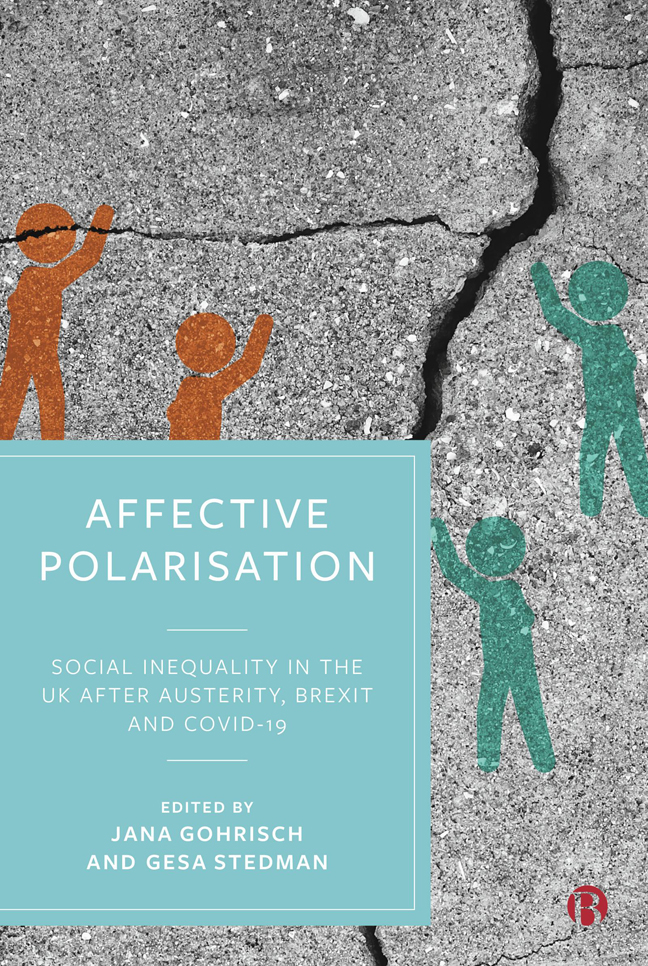Book contents
- Frontmatter
- Contents
- List of Figures, Tables and Boxes
- Notes on Contributors
- Acknowledgements
- Introduction
- 1 The Divided Left in the UK: Partisanship, Ideology and Class after Brexit
- 2 Populism and the People: Elitism, Authoritarianism and Libertarianism
- 3 ‘Coloring the Utterance with Some Kind of Perceivable Affect’: Constructing ‘Country’ and ‘People’ in Speeches by Theresa May and Boris Johnson – A Linguistic Perspective
- 4 The Challenges of Polarisation: Lessons for (Re-)Politicising Inequality across Four English Towns
- 5 “Go Away, But Don't Leave Us”: Affective Polarisation and the Precarisation of Romanian Essential Workers in the UK
- 6 Racialised Affective Polarisation in the UK
- 7 “Now You Have to Listen”: A Historical Analysis of Britain’s Left-Behind Communities
- 8 Britain in a State of Emergency: Studying Ken Loach's Films I, Daniel Blake (2016) and Sorry We Missed You (2019)
- 9 Cloaking Class: Making the Working Class Visible
- 10 Class, Poverty and Inequality in Scotland: Independence and the Creation of Affective Polarisations
- 11 Language and Identity: The Taliesin Tradition
- Conclusion
- Index
3 - ‘Coloring the Utterance with Some Kind of Perceivable Affect’: Constructing ‘Country’ and ‘People’ in Speeches by Theresa May and Boris Johnson – A Linguistic Perspective
Published online by Cambridge University Press: 23 January 2024
- Frontmatter
- Contents
- List of Figures, Tables and Boxes
- Notes on Contributors
- Acknowledgements
- Introduction
- 1 The Divided Left in the UK: Partisanship, Ideology and Class after Brexit
- 2 Populism and the People: Elitism, Authoritarianism and Libertarianism
- 3 ‘Coloring the Utterance with Some Kind of Perceivable Affect’: Constructing ‘Country’ and ‘People’ in Speeches by Theresa May and Boris Johnson – A Linguistic Perspective
- 4 The Challenges of Polarisation: Lessons for (Re-)Politicising Inequality across Four English Towns
- 5 “Go Away, But Don't Leave Us”: Affective Polarisation and the Precarisation of Romanian Essential Workers in the UK
- 6 Racialised Affective Polarisation in the UK
- 7 “Now You Have to Listen”: A Historical Analysis of Britain’s Left-Behind Communities
- 8 Britain in a State of Emergency: Studying Ken Loach's Films I, Daniel Blake (2016) and Sorry We Missed You (2019)
- 9 Cloaking Class: Making the Working Class Visible
- 10 Class, Poverty and Inequality in Scotland: Independence and the Creation of Affective Polarisations
- 11 Language and Identity: The Taliesin Tradition
- Conclusion
- Index
Summary
Introduction
Goffman's (1978, p 813) famous dictum that provides the chapter's title followed by Sacks (1992 [1972], p 572), who pointed out that ‘we won't find that strong sorrow and joy are just distributed over the course of the conversation but instead, there are real places for them to occur’, and Jefferson (1988), who among other things, studied the ways in which talk about troubles makes relevant affiliative responses, pave the way for a research avenue that considers emotion as a relevant aspect of the organisation and structure of discourse.
The aim of this chapter is to analyse the conceptualisation of selected key terms of the referendum debate in the UK by identifying accessible patterns of language use. Available evidence suggests that displays of emotion in the language of top agents seem to be crucial in institutional and formal settings and in various modalities of expression (spoken and written), including grammar but to the exclusion of prosodic features, facial expressions or body gestures.
Provided that language can be viewed as a collective repository of memory chunks linked to units of conceptual knowledge such as schemas, categories and conceptual metaphors, and metonymies or blends, lexical concepts used in two selected speeches will be seen as exponents of discursively constructed ideas and values. Different constructions of British interests currently centre around concepts such as sovereignty, identity, immigration and economics, and it does not come as a surprise that in the context of Brexit, some top agents in politics and the media in particular view Britain as the victim at the hands of the EU, appealing to ‘the people’ to take back (power) control from the government and the elite or encouraging ‘our great country’ to rely on its strength and determination. The construction of ‘the people’ versus ‘the government’ or ‘the elite’ is an ordinary ‘us’ or ‘self ‘ versus ‘them’ or ‘other’ construction where common unity (or disunity) and consensus (or dissent) is invoked through populist discourse (see section Theoretical orientations: discourse, meaning, language use on polarity-indicating and polarity-evoking devices and section Conclusion on populism).
- Type
- Chapter
- Information
- Affective PolarisationSocial Inequality in the UK after Austerity, Brexit and COVID-19, pp. 60 - 77Publisher: Bristol University PressPrint publication year: 2023



